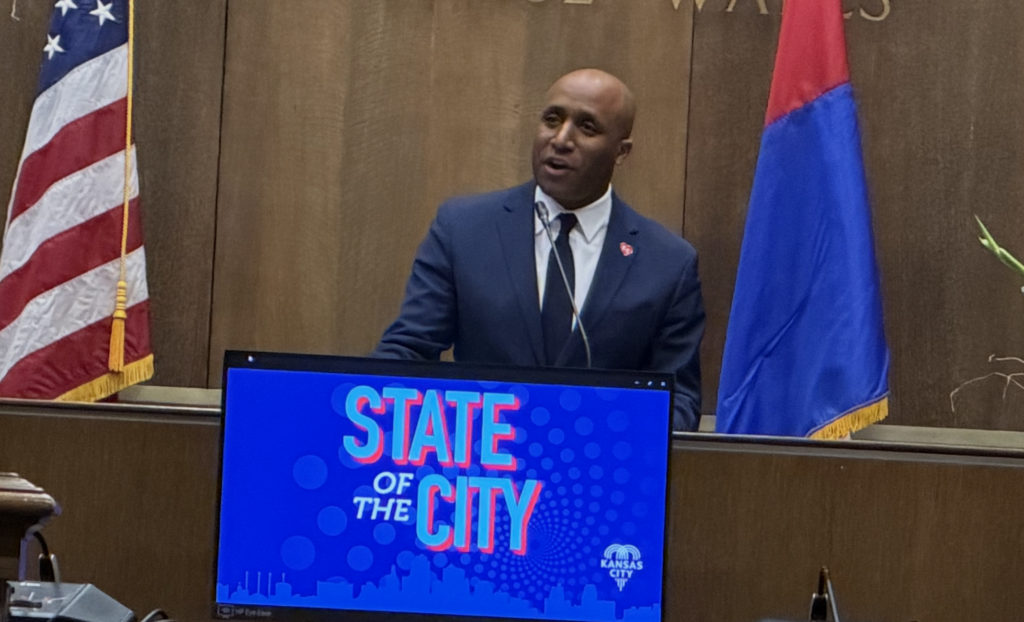Forgive Us Our Debts

Members of Christ the King Catholic Church at 8510 Wornall Road were puzzled. Even as the nation rode high on one of the longest waves of economic growth in history, the church’s food pantry, which provides sustenance for the poor, was attracting more and more clients. Church members set out to understand why.
“It started slowly,” says Virginia Scaletty, member of the church. “We just started asking questions.”
They discovered that many of their food pantry’s visitors were in debt to payday loan companies — storefront operations that give small but costly short-term loans. Working with the multidenominational Church/Community Organization, Christ the King parishioners found that other churches had seen the same problem, although borrowers weren’t eager to share their stories. Most were ashamed. “We told them, ‘Look, there isn’t anybody out there who doesn’t have a loan,'” says Jerry Young, community organizer for CCO. “We’re a nation of borrowers. They just walked through the wrong door.”
Eventually the church people found Mary Pat, a single mother of two who works as an administrative assistant. She can’t afford dental insurance, so when she recently developed an abscessed tooth, she had to somehow pay for a root canal. She found a dentist who was willing to do it for $300, but she had to pay cash up front. “I did not feel I had any options,” she says. “I was running a fever and I just wanted the pain to end.”
At a payday loan outlet, she wrote a postdated check for $345 to receive the $300 she would need for the operation — such loan operations charge high service fees up front. That gave her five days to cover the check before it would be cashed. But because her weekly checks were a mere $348 at the time, she knew she couldn’t cover it. To avoid bank charges and eventual criminal prosecution, she went back to the loan outlet the following week to refinance. That cost her $50.
And on and on it went: $50 every two weeks for four months. At one point, after spending more than $350, she asked how much she still owed. Her balance was locked in at $300. Because of lax state laws, payday lenders can refuse partial payment of loan balances, so borrowers have to refinance every payday for a fee or pay off the full loan.
“We thought, ‘This is ridiculous,'” recalls Scaletty. “They’re gouging people who can least afford it.”
Church members went after the industry. Payday loan operations arrived in Missouri in 1992, but they proliferated after state laws were tweaked in 1998. Now 74 payday loan outlets operate in Kansas City, 208 in the metro area and 650 statewide. Until this past week, Missouri laws allowed them to charge nearly 800 percent interest.
But CCO members discovered that these operations stretch the law as well. To get around provisions limiting the amount people can borrow, owners operate multiple companies. As part of CCO’s research, Young took out a loan at an outlet in south Kansas City, then asked whether he could get more money. The person behind the counter told him that would be no problem but he’d need to step into the payday loan outlet next door. When he got to the other store’s counter he found the same clerk ready to serve him. “I just thought that was hilarious,” Young recalls. “They’re just so open and flagrant about bending and going around the law. They just don’t care.”
CCO estimates that payday loan outlets in the metro area average $25,000 each week in revenue. “That’s pretty amazing,” Young says. “Then we started counting how many there are. We just did the math. And that’s an awful lot of money leaving the community.” CCO’s survey of payday loan borrowers revealed that 80 percent of them depend on charity or social services to survive.
For a time, the industry was subsidized by the Jackson County prosecutor’s office, which served as a sort of collection agency when postdated checks bounced. But CCO put an end to that by inviting County Prosecutor Bob Beaird’s staff to a meeting at Christ the King and persuading him to investigate how many county resources were devoted to payday loan collections.
Then, in mid-April, members of CCO sat down with Governor Bob Holden for a presentation on payday loans and several other urban problems the group hoped to quell. The church members recall that the governor was shocked by what he heard. “His comment was, ‘Is this for real?'” Scaletty says.
“What amazes us is people in power have no idea how payday loans work,” says Betsy Weinzirl, a fellow member of Christ the King. “They don’t even know it’s out there.”
On the same day as their meeting with the governor, CCO members met with State Auditor Claire McCaskill. Her office was already deep into its own investigation of the industry, which culminated in a scathing report that showed that payday loan companies are not regulated. According to Bill Miller, director of audits for the state, the report will help the Division of Finance get more muscle to regulate the industry. It could also pave the way for tougher laws.
Members of CCO are already pushing in that direction. Their next step is to work with other churches across the state to mount a bigger force to toughen a law the governor signed last week in Jefferson City. That law, which was packaged with reforms of the car-title loan industry, capped the amount of time borrowers have to wait (three months) until lenders must accept partial payments on loan principal. Before the bill, borrowers were allowed to pay off the amount only in full, so if they couldn’t come up with an extra $300, as was the case with Mary Pat, their only choice was to keep refinancing and pay the high weekly fees. “It’s a starting point,” Young says, “but people still have to pay triple-digit interest for almost three months.”
The current goal is to get the interest rate capped on these loans. “In states where this is regulated or outlawed, the cap is usually 26 percent,” says Weinzirl. “We think that’s as high as it should be. Even 30 percent would be nice.”
Young thinks that’s more than enough for the industry to claim a profit: “Thirty percent. It’s still damn high.”
Jerry Ayles, president of Payday and Paycheck Loans Consulting of California, says that would hurt his industry. High interest rates are necessary to counter default rates, which he claims range from 8 percent to 15 percent. “If they limit them, then [the lenders] are history,” he says. “There’s no way they’ll be able to survive in Missouri with those restrictions.”




